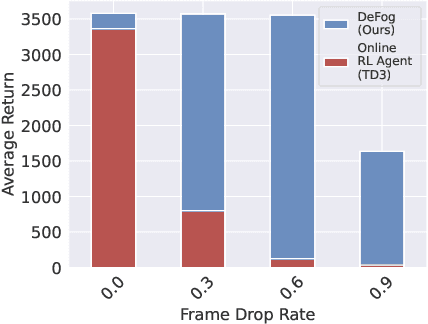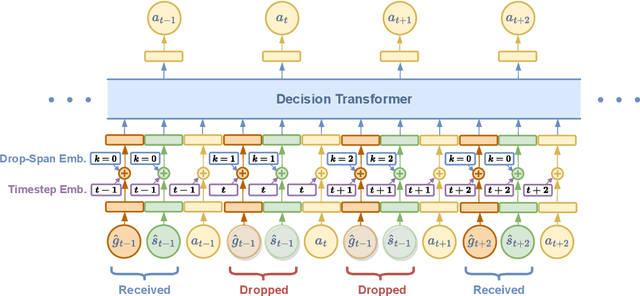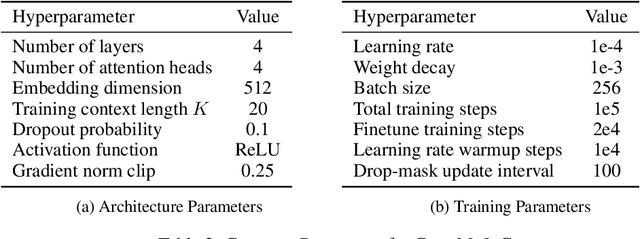Ray Chen Zheng
Decision Transformer under Random Frame Dropping
Mar 03, 2023



Abstract:Controlling agents remotely with deep reinforcement learning~(DRL) in the real world is yet to come. One crucial stepping stone is to devise RL algorithms that are robust in the face of dropped information from corrupted communication or malfunctioning sensors. Typical RL methods usually require considerable online interaction data that are costly and unsafe to collect in the real world. Furthermore, when applying to the frame dropping scenarios, they perform unsatisfactorily even with moderate drop rates. To address these issues, we propose Decision Transformer under Random Frame Dropping~(DeFog), an offline RL algorithm that enables agents to act robustly in frame dropping scenarios without online interaction. DeFog first randomly masks out data in the offline datasets and explicitly adds the time span of frame dropping as inputs. After that, a finetuning stage on the same offline dataset with a higher mask rate would further boost the performance. Empirical results show that DeFog outperforms strong baselines under severe frame drop rates like 90\%, while maintaining similar returns under non-frame-dropping conditions in the regular MuJoCo control benchmarks and the Atari environments. Our approach offers a robust and deployable solution for controlling agents in real-world environments with limited or unreliable data.
Extraneousness-Aware Imitation Learning
Oct 04, 2022



Abstract:Visual imitation learning provides an effective framework to learn skills from demonstrations. However, the quality of the provided demonstrations usually significantly affects the ability of an agent to acquire desired skills. Therefore, the standard visual imitation learning assumes near-optimal demonstrations, which are expensive or sometimes prohibitive to collect. Previous works propose to learn from noisy demonstrations; however, the noise is usually assumed to follow a context-independent distribution such as a uniform or gaussian distribution. In this paper, we consider another crucial yet underexplored setting -- imitation learning with task-irrelevant yet locally consistent segments in the demonstrations (e.g., wiping sweat while cutting potatoes in a cooking tutorial). We argue that such noise is common in real world data and term them "extraneous" segments. To tackle this problem, we introduce Extraneousness-Aware Imitation Learning (EIL), a self-supervised approach that learns visuomotor policies from third-person demonstrations with extraneous subsequences. EIL learns action-conditioned observation embeddings in a self-supervised manner and retrieves task-relevant observations across visual demonstrations while excluding the extraneous ones. Experimental results show that EIL outperforms strong baselines and achieves comparable policies to those trained with perfect demonstration on both simulated and real-world robot control tasks. The project page can be found at https://sites.google.com/view/eil-website.
 Add to Chrome
Add to Chrome Add to Firefox
Add to Firefox Add to Edge
Add to Edge